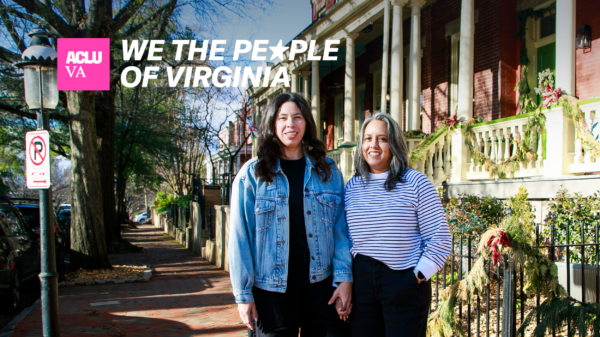To Get to Virginians, the Trump Administration Has to Get Past Us
2025 has been quite a year. Since President Trump was inaugurated in January, the ACLU has filed more than 180 lawsuits against the Trump administration.
Here in Virginia, federal overreach has made it even more critical that we protect Virginians’ civil rights and liberties.
Check out our annual report to see how YOU helped us hold the line this year in our collective fight for our rights – and what’s ahead for 2026.
How We're Fighting Trump's Abuse of Power
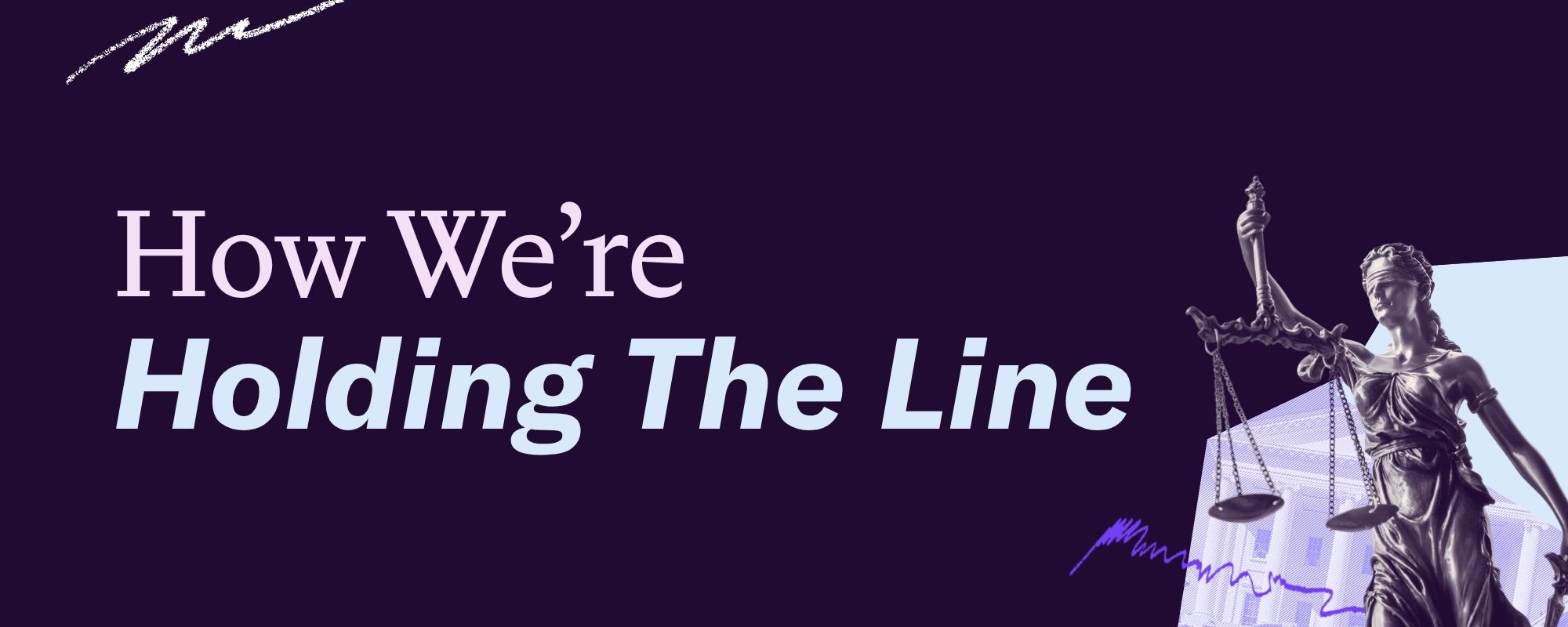
The Trump administration has levied attacks this year on the most vulnerable Virginians and the constitutional freedoms that protect all of us, like the First Amendment.
Among the first executive orders that President Trump signed were two banning “gender ideology” and “discriminatory equity ideology” from schools that receive federal funding. Shortly after, the Department of Defense Education Activity (DoDEA), which provides pre-K-12 education to approximately 67,000 children of military personnel around the world, canceled events, axed curricula, and removed books like To Kill a Mockingbird from military schools.
That’s unconstitutional. Students in military families have the same First Amendment rights as all other students. So along with the ACLU of Kentucky and the national ACLU, we sued the Trump administration on behalf of 12 DoDEA students from six families stationed in Virginia, Kentucky, Italy, and Japan. A federal judge ruled DoDEA must stop its censorship and put books back in classrooms – a huge win for anyone who values full libraries and vibrant classrooms.

That's not the only First Amendment case we took this year.
In March, a Georgetown professor was returning home from an iftar meal for Ramadan when masked, unidentified agents stopped him outside his apartment where his three young children were sleeping. These agents forced him into a car and shuffled him to five different detention centers in just 72 hours – all without charging him or even accusing him of a crime, or letting him talk to his lawyer.
For almost two months, Immigration and Customs Enforcement (ICE) held Dr. Badar Khan Suri in a detention center in Texas, before our lawsuit finally forced ICE to let him go.
Why detain him? Despite being a respected professor of religion and peace processes, the Trump administration targeted Dr. Suri for his constitutionally-protected speech on Palestinian rights and for his association with his wife, a U.S. citizen of Palestinian origin. Even now, the government is trying to appeal the decision that freed Dr. Suri just so that it can re-detain him.
But the First Amendment protects all of us – regardless of our citizenship – from being targeted by the government for our political speech.
This year, the Trump administration has tried to silence speech it doesn’t agree with by going after people like Dr. Khan Suri and Mahmoud Khalil. But ideas are not illegal – so we’re fighting back. Americans don’t want to live in a country where the federal government “disappears” people whose views it doesn’t like.
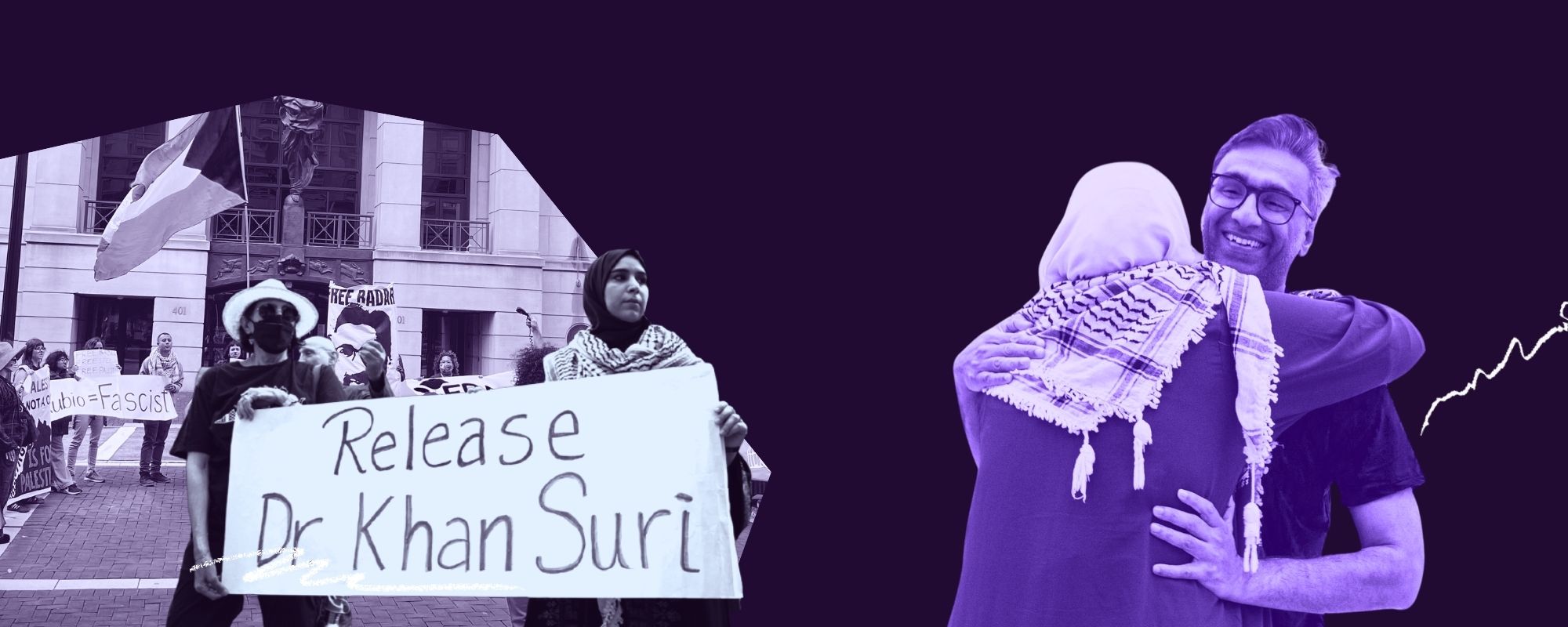
ICE arrests have increased significantly in Virginia this year – over 300 percent – in a state where one in four people is either a child of an immigrant or an immigrant themselves. Only five states have seen a larger increase in immigration arrests than Virginia, according to reporting by the New York Times.
In October, we filed a lawsuit on behalf of four young immigrants and a class of others who came to the U.S. as unaccompanied minors who had been abused, neglected, or abandoned. Federal laws say that these individuals have a legal right to be in the United States. But ICE ignored the law, rounded those young people up, and is unlawfully holding them in detention centers anyway.
Congress established a pathway to citizenship almost 40 years ago for children who have been abused, neglected or abandoned. Our clients are following the rules that have long been established to obtain residency and citizenship – but ICE is breaking those rules.
People who came to the U.S. as unaccompanied minors are protected from being held in immigration detention centers without access to bond, both by anti-trafficking laws and the pathway Congress established. But ICE is ignoring the law – ultimately causing the very chaos and confusion the Trump administration claims it’s working to fix.

This year, ICE’s determination to rip families apart has created a humanitarian crisis in ICE facilities, including those in Virginia, where there are two major ones.
Our legal team is investigating those conditions, showing up at courthouses in Virginia when we get tips ICE is present, and most crucially, mobilizing communities across the Commonwealth to know their rights. We’re working closely with coalition partners to share information and investigate abuses, so that together, we can empower Virginians to defend their neighbors right alongside us.
Since January, we’ve done more than 30 Know Your Rights workshops in multiple languages for interacting with ICE and the police. And we've done over a dozen trainings about gender-affirming care, name and gender-marker changes, and the avalanche of the Trump administration’s anti-transgender executive orders.
This summer, when the Supreme Court ruled that states can ban lifesaving, gender-affirming medical care for young people, we also hosted a webinar for trans Virginians and their families. Our goal: make a complicated legal opinion actionable for the very communities it affects. After all, to exercise your rights, you have to know what they are. We’re committed to making sure that all Virginians – and especially the Virginians who need them most – know their rights and can help their neighbors know them, too.
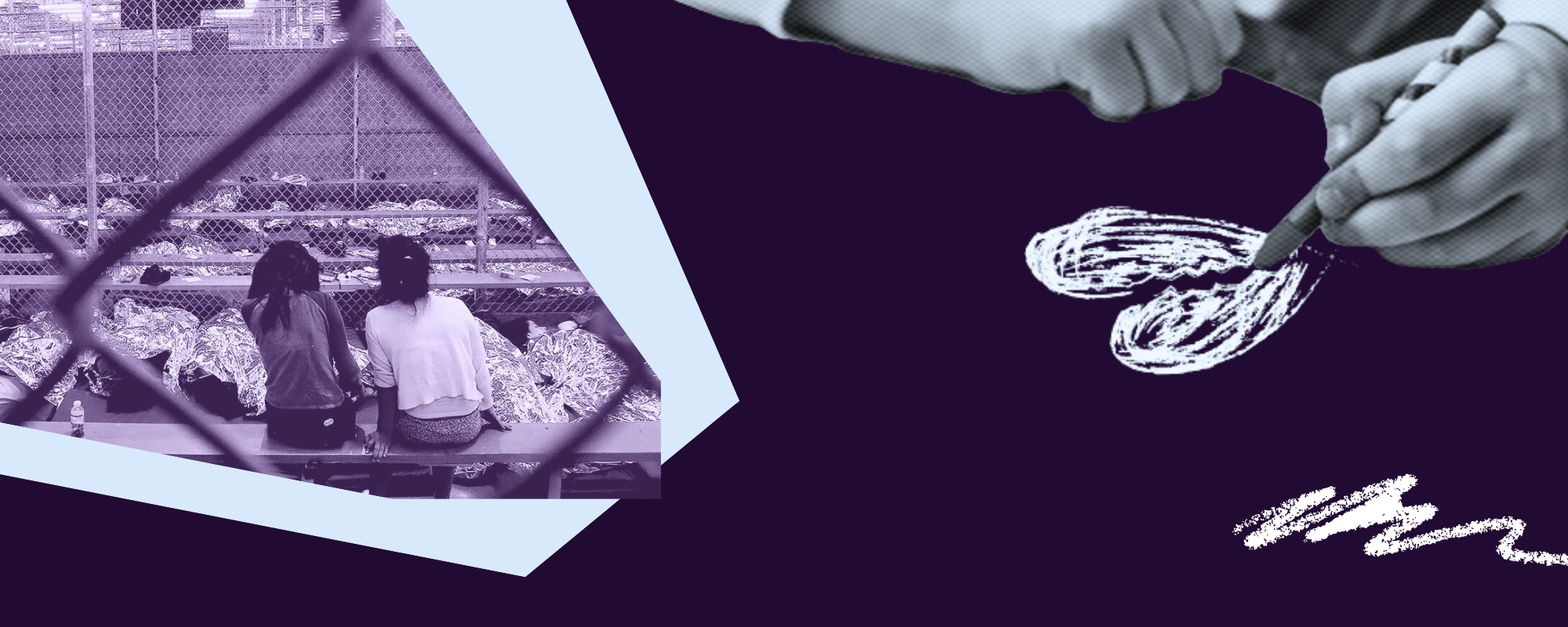
Gender-affirming medical care is still legal in Virginia, and we’re fighting to keep it that way. But healthcare providers and patients are also facing a tsunami of threats from the Trump administration pressuring them to stop providing or accessing care – even if it is legal. Our job is to make sure they don’t.
When the University of Virginia and Virginia Commonwealth University cut off gender-affirming medical care for existing patients under 19, we successfully pressured them both to resume it. Today, we’re working with Virginia doctors, nurses, and clinicians who are committed to giving their patients the best evidence-based care, full stop.
All across the Commonwealth, we meet Virginians who are committed to protecting their LGBTQ+ neighbors, too. Take the five school districts in Northern Virginia who are standing up to the Trump administration, which is trying to pressure them into violating Title IX by denying their trans students access to safe restrooms and locker rooms.
If the school districts were to cave to the pressure, they wouldn’t just violate the law: they would effectively push trans and nonbinary students out of public schools altogether. With our support, all five school districts have refused to go along with the Trump administration’s hateful agenda.
That’s the power of community engagement. This year, we’ve distributed more than 5,000 free copies of our “Celebrating Trans Joy” zine to students, teachers, advocates, counselors, and ordinary people, and together, the message is clear: trans and nonbinary Virginians aren’t going anywhere.
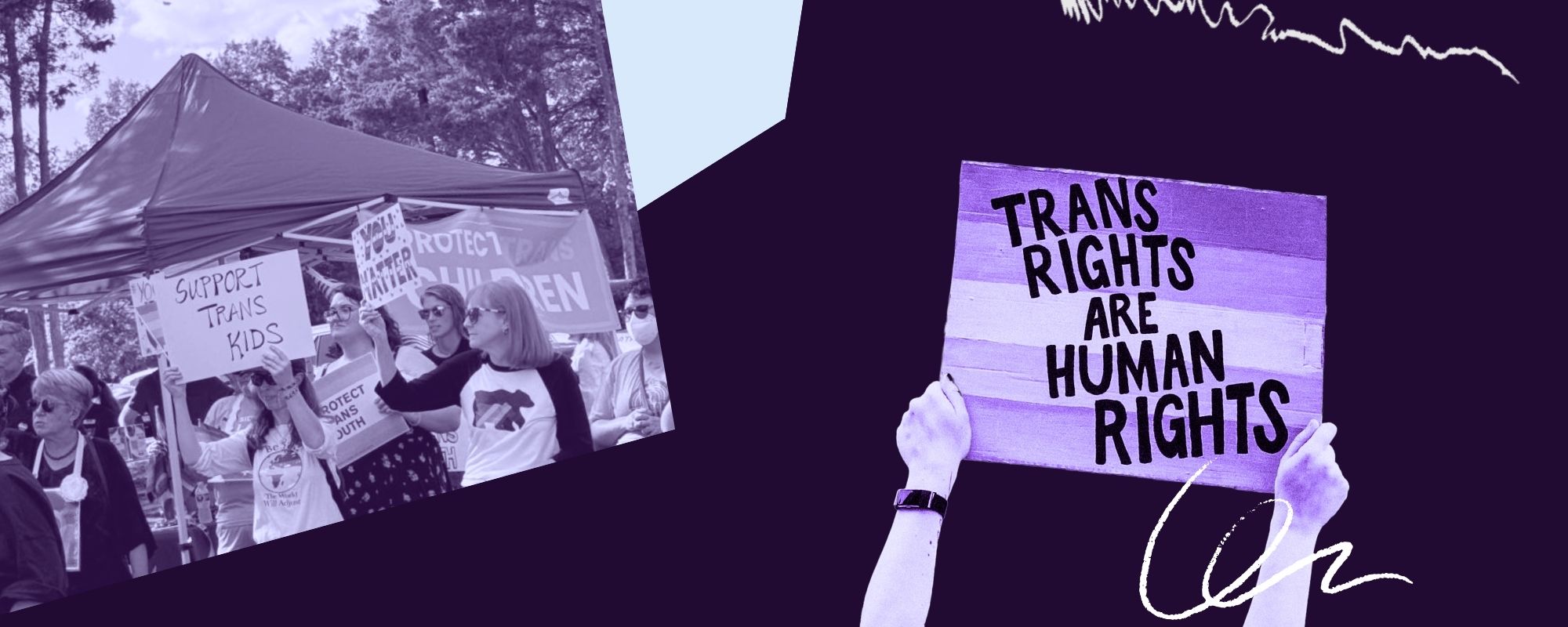
The ACLU of Virginia is made up of thousands of members who have demonstrated over and over that together, we can hold the line against unrelenting attacks on our rights.
To protect Virginians’ civil rights and civil liberties takes more than just fighting the Trump administration. Virginians are vulnerable to attacks on our rights at both the federal and the state level.
So before President Trump was even sworn in, our experts met with Virginia lawmakers at the Capitol in Richmond. Our agenda?
Defeat bills that would have discriminated against transgender young people in extracurriculars, denied them safe use of restrooms in public, and barred them from accessing life-saving, gender-affirming medical care.
Defeat bills that would have allowed ICE to hold children in custody, required a mandatory immigration inquiry when people apply for public assistance, or forced localities to cooperate with ICE.
And many more. Together, we defeated every single one of these proposals.

During the 2025 General Assembly, ACLU of Virginia staff and members killed more than 40 pieces of anti-civil-rights legislation before they could become law.
We also passed proactive legislation to strengthen protections of Virginians’ rights.
For example, we worked with lawmakers to pass one of the strongest restrictions in the country on surveillance technology called automatic license plate readers (ALPRs).
The new restrictions prohibit Virginia police from sharing tracking data with the Trump administration and require Virginians’ data to be regularly purged.
And not a minute too soon: this year, ICE has used ALPRs to target immigrants all over the United States.
Supercharged by AI, government surveillance is rapidly expanding. The erosion of privacy is a direct threat to anyone in the crosshairs of the Trump administration – including our immigrant neighbors, people seeking reproductive and gender-affirming care, and everyone protesting for democracy.
How We're Shoring Up Our Rights At Home
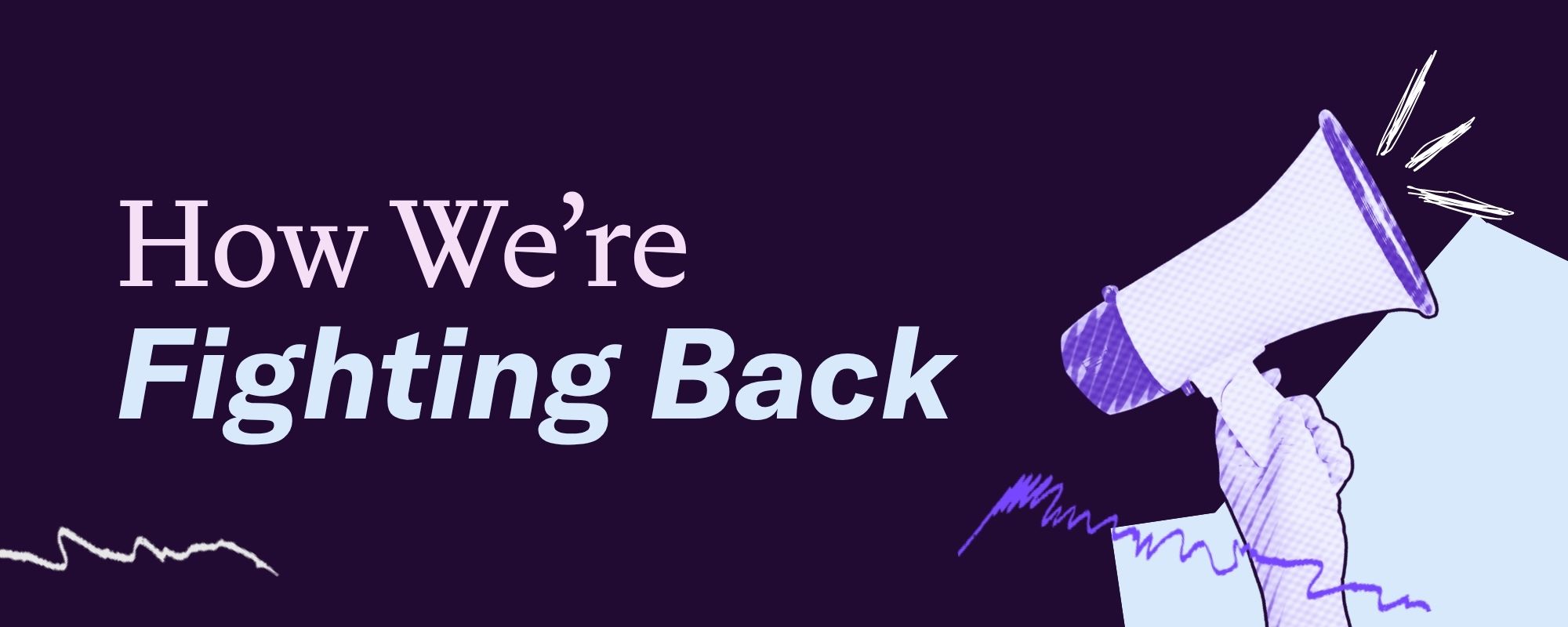
When lawmakers return to the Capitol in Richmond next January, we'll be there, ready to advocate to protect Virginians from escalating attacks on our civil rights and civil liberties. To meet the moment, we’re setting our sights even higher than Virginia Code, and aiming for Virginia’s constitution.
Enshrining our rights in Virginia’s constitution would mean no matter who’s in office, our rights would be as secure as possible. In 2025, we pushed Virginia lawmakers to pass language for three amendments to Virginia’s constitution: one to protect Virginians’ reproductive freedom, one to guarantee marriage equality in the Commonwealth, and one to expand the right to vote.
The amendments are far from a done deal. Passing a constitutional amendment is a multi-year process, and these amendments will only become part of Virginia’s constitution if lawmakers pass the exact same language again in this year’s upcoming legislative session.
Only then would Virginians finally get the chance to vote on the amendments themselves, when the proposals would go on the ballot for the November 2026 election. After all, our civil rights and civil liberties should never be left to the whims of politicians.
As federal attacks on our freedoms escalate, that couldn’t be more important. Virginia is the only state in the South that didn’t pass an abortion ban after Roe v. Wade was overturned, and since 2022, it's seen the largest increase in out-of-state patients seeking reproductive healthcare of any state. A constitutional amendment would protect access to reproductive healthcare in Virginia – from contraception to childbirth – from government interference.
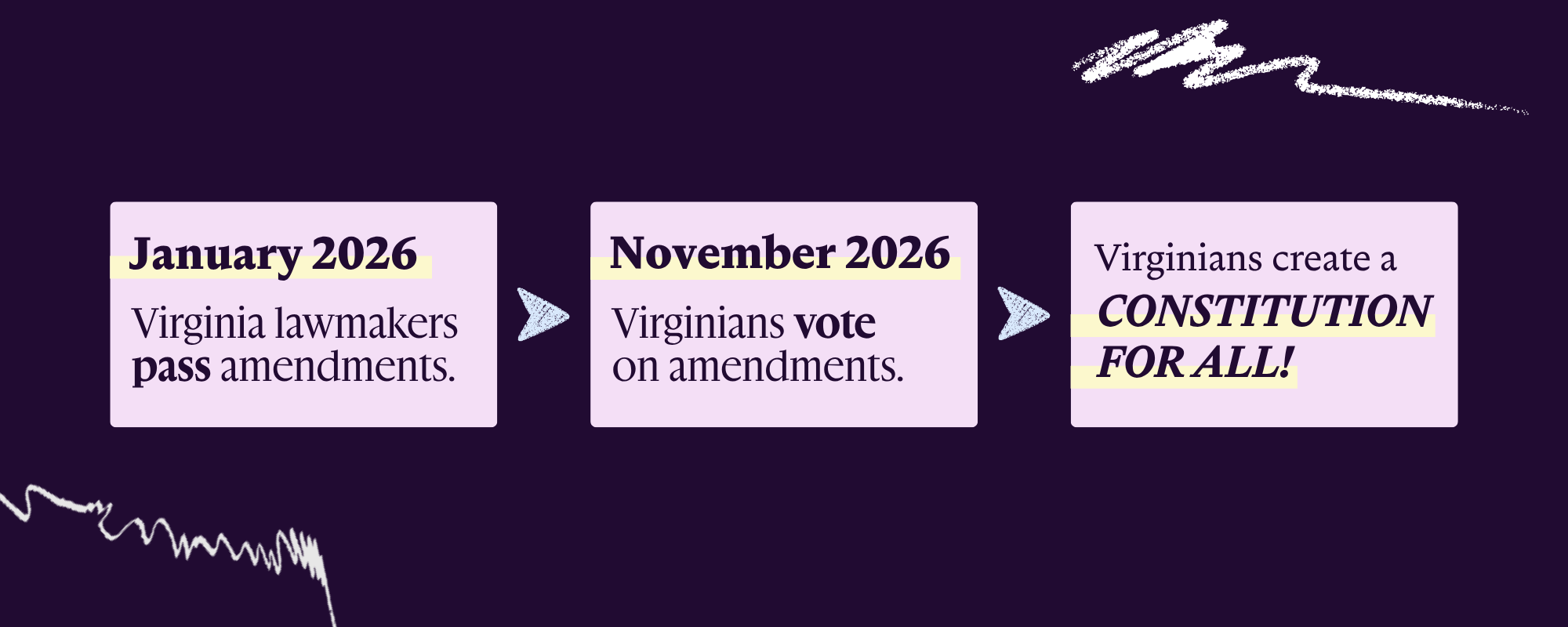
Other fundamental freedoms are vulnerable to federal threats, too. For example, in Virginia, same-sex marriage is prohibited by our state constitution: it’s only currently possible because federal court decisions legalizing it override the outdated ban on same-sex marriage that’s still written into Virginia’s constitution.
If the Supreme Court decision legalizing same-sex marriage nationwide were overturned, then Virginia’s constitutional ban could go into effect. An amendment to Virginia’s state constitution would ensure no matter what happens at the federal level, Virginia marriages would be protected.
The third amendment to Virginia’s constitution that we're pushing lawmakers to pass is different than the first two, which seek to protect the rights we already have. The third amendment seeks to right a wrong: it would eliminate the Commonwealth’s policy of permanently stripping anyone with a felony conviction of their right to vote.
It's no exaggeration to call Virginia’s felony disenfranchisement law a relic of Jim Crow. After the Civil War, former Confederate states like Virginia were determined to keep newly freed Black people from voting, so they expanded felony laws and selectively enforced them against free Black people – then used those convictions to systematically strip people of their right to vote.
More than a century later, Virginia is the harshest state in the country when it comes to restoring the right to vote after a felony conviction. Virginia’s Black residents are still disenfranchised at one of the highest rates in the country: today, one in 10 Black adults in Virginia is disenfranchised because of a felony conviction.
A constitutional amendment would put the right to vote out of reach of individual governors or parties, and it would make sure that everyone’s right to vote is automatically restored when they’re released from prison. After all, our democracy doesn’t work unless everyone has a voice.

These three constitutional amendments are one reason that we chose to make our largest ever investment in voter education this fall.
We’re nonpartisan, and we don’t endorse candidates, but the lawmakers who Virginians elected this November will be the ones who determine whether these constitutional amendments move forward to the ballot for Virginians to vote on in November 2026.
In other words, Virginia’s election this year determines whether Virginians will get to vote directly on whether lifesaving reproductive healthcare remains accessible in the Commonwealth, whether Virginians can marry the person they love, and whether people who have served their time can participate in our democracy.
Amending Virginia’s constitution is ambitious. To do it three times? Even more so.
But we’re not in this alone: we’re working with coalitions of grassroots partners and everyday Virginians on all three constitutional amendments because we know that to do this work takes people power.
We Need You
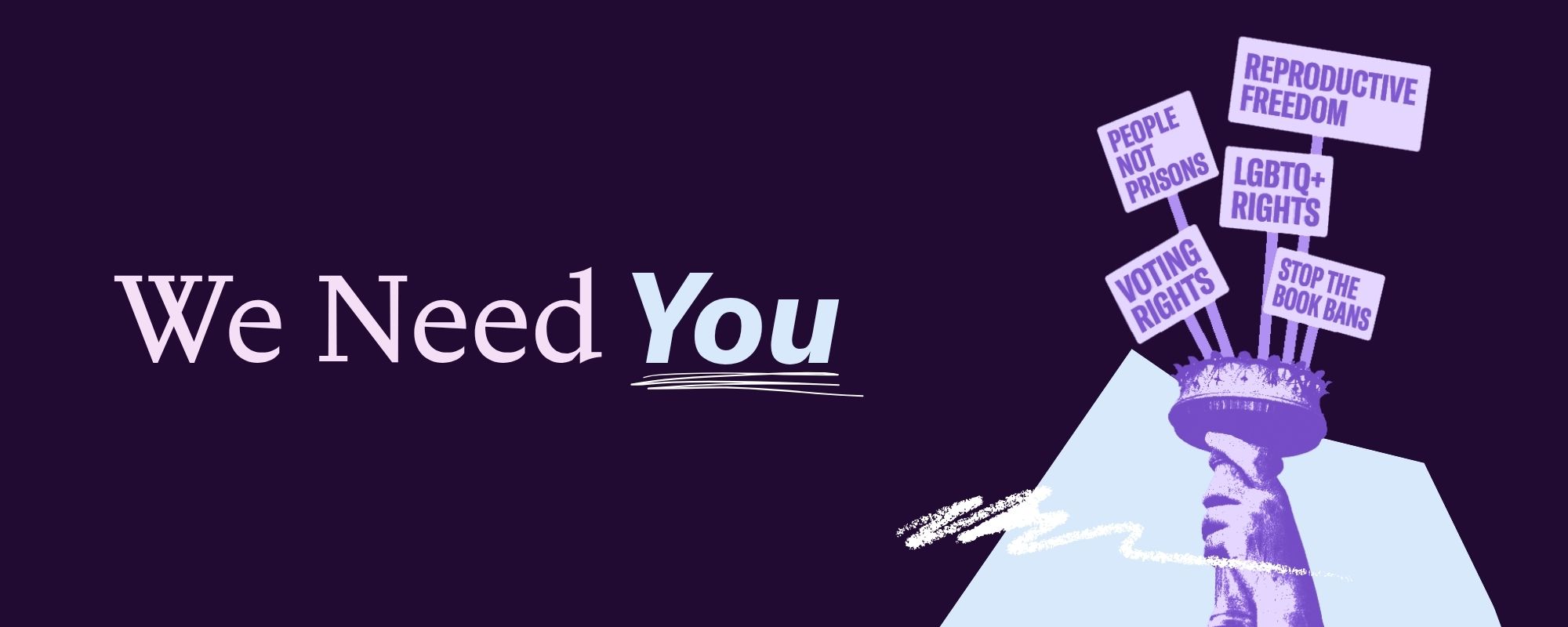
It’s only thanks to YOU that we can integrate different tools like lawsuits, legislation, and community organizing into a single advocacy strategy.
It takes resources to do this work, and it takes committed people like you to make sure we’re everywhere that we’re needed.
This year, we’ve almost doubled our membership, and we’ve more than doubled our reach on social media. That’s more Virginians who know their rights, more communities who have an informed advocate to turn to, and more people who are part of this movement for freedom and justice in the Commonwealth.
The highlights we listed above are just some of the work that your support enabled us to do in 2025. Together, just imagine what we can do in 2026 to fight back against federal overreach.
Immigrants’ rights, reproductive freedom, voting rights, and more are all at risk right now. To be in the courts, in the legislature, and in communities, we need you with us.
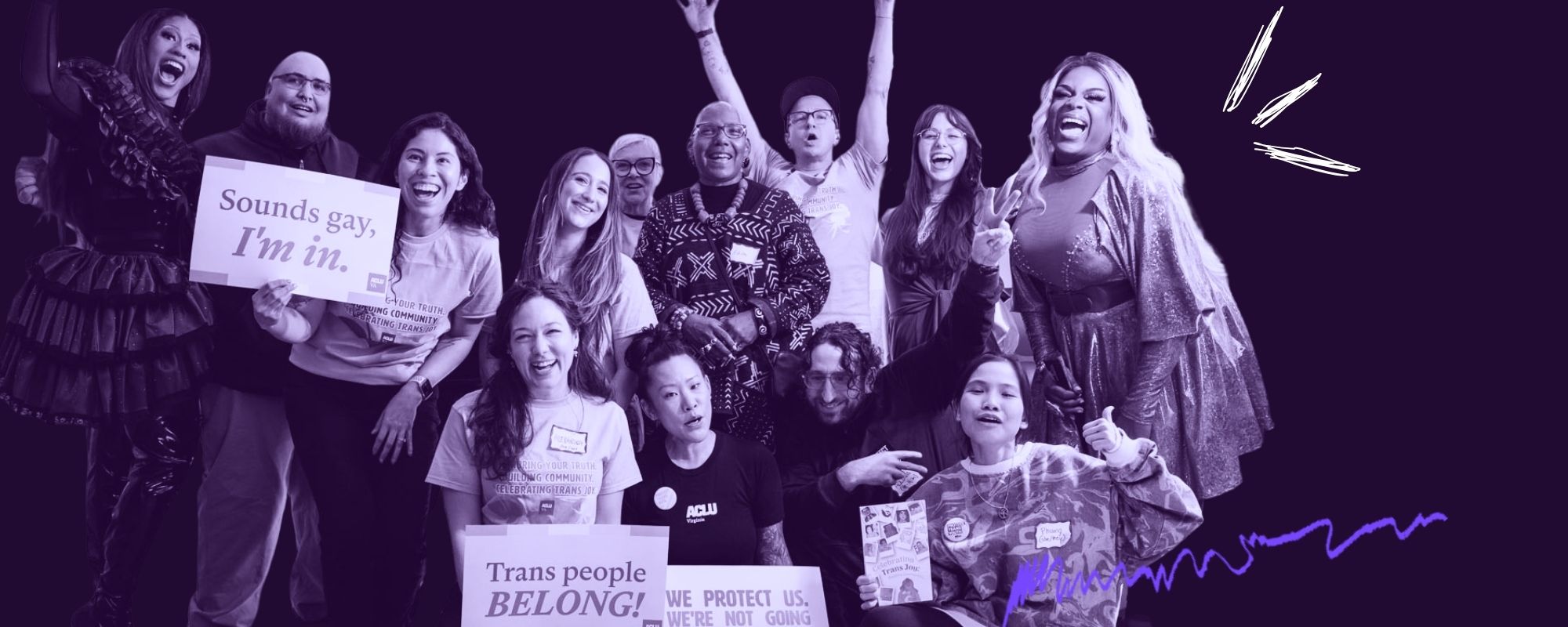
You can join this work in lots of ways. If you’re not already, become a member of the ACLU of Virginia, and join our close to 40,000 members who fuel the fight for our freedom.
Invite your friends and family to become part of this collective with you, and join the real-world work our members do: for example, meeting with lawmakers in Richmond, or taking part in the “CLAP Back teams” our organizers are forming around the state to galvanize local communities around the need for amendments to Virginia’s constitution.
To show up everywhere we’re needed with experts ready to defend Virginians’ civil rights and civil liberties takes significant resources. To meet the urgency of this moment – and stay in it for the long haul – takes people power and financial support.
Our success protecting democracy and defending Virginians against the Trump administration comes down to one thing: you.
We simply cannot do this work without our members and supporters – people like you – who fuel the fight for our freedom. We’re proud to partner with people who understand the stakes, and who are committed to making Virginia a safe and inclusive place for us all.
To meet this moment will take all of us. Together, we can safeguard Virginians’ civil rights and civil liberties – no matter who’s in office.
See you in 2026!


